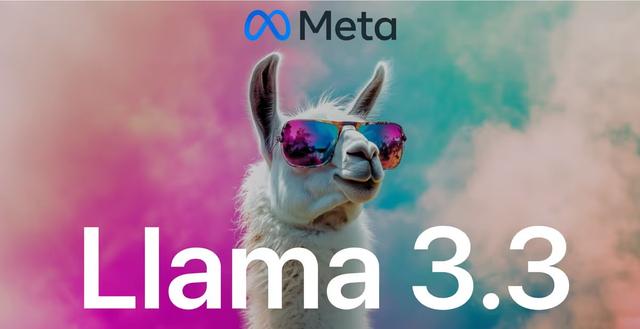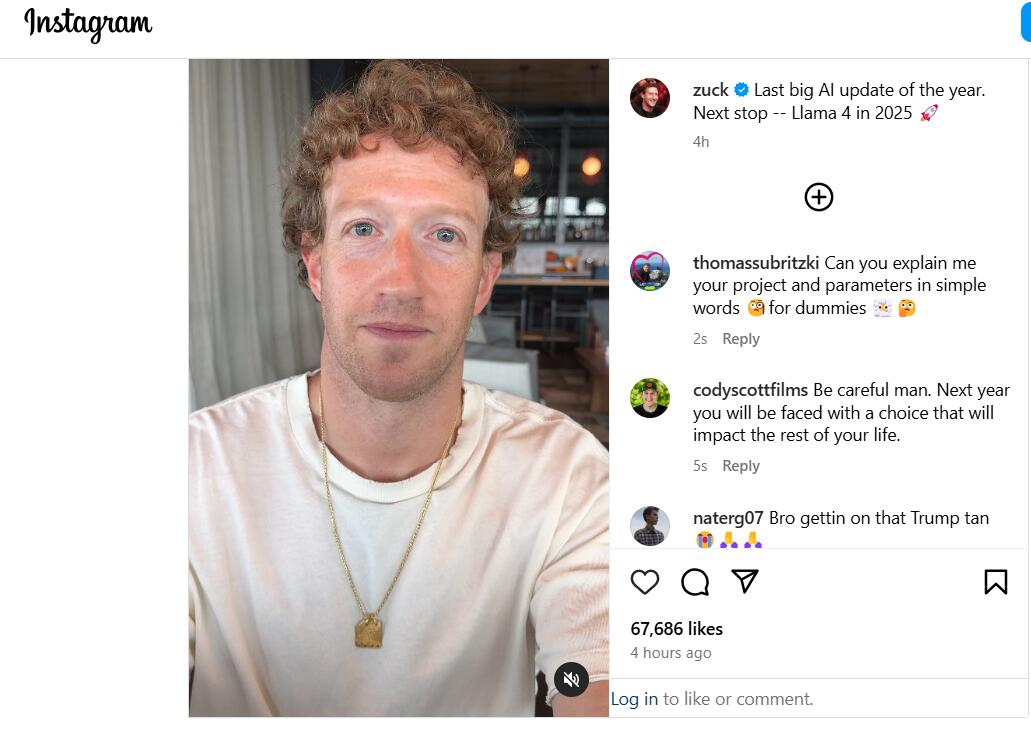
On Friday, December 6, Eastern time, Meta announced the launch of a new Llama series of generative AI models: the 7 billion parameter Llama 3.3. Also known as Llama 3.3 70B。 CEO Zuckerberg said on his social media Instagram that this is the last AI model update this year, and the next step is next year's Llama 4 appearances.

Llama 3.3 is challenging for the industry leader
Ahmad Al-Dahle, vice president of generative AI at Meta, announced on social media X that the latest text-only model, Llama 3.3, is capable of achieving performance comparable to the company's largest Llama model, Llama 3.1 with 405 billion parameters, at a lower cost. Al-Dahle highlighted that by adopting the latest post-training technology advances, including online preference optimization, Llama 3.3 not only dramatically reduces costs, but also improves core performance and makes it more acceptable to the entire open source community.
The accompanying published chart shows that in a series of industry benchmarks, Llama: The 3.3 outperforms Google's Gemini 1.5 Pro, OpenAI's GPT-4o, and Amazon's recently launched Nova Pro, especially in the large model language understanding ability test MMLU. According to a Meta spokesperson, the model has seen significant improvements in mathematical reasoning, common sense understanding, instruction adherence, and application usage.
Llama 3.3 is now available on Llama's official website and AI development platform Hugging Face and other channels are open for download. The review notes that the move demonstrates Meta's commitment to dominating the AI model market by providing open-source models for a wide range of commercial applications, and Llama 3.3 is the latest result of this strategy.
|Meta AI is expected to become one of the most widely used AI assistants in the world
Meta released Llama in July of this year 3.1, the model has 405 billion parameters, benchmarking OpenAI and Google's large models. To train this behemoth, Meta used 16,000 Nvidia H100s GPUs, combined with new training and development techniques, make Llama 3.1 Capable of competing with OpenAI's GPT-4o and Anthropic's Claude in terms of performance 3.5 Sonnet Counters.
Meta founder Mark Zuckerberg called Llama 3.1 is "The Beginning of Art", emphasizing its wide range of new abilities, including improved reasoning skills to deal with complex mathematical problems, and even synthesizing an entire book on the fly. This marks Meta's ambitions and technological prowess in the field of AI.
Despite Llama 3.1 is open source and Meta sets certain restrictions on its use. For example, platforms with more than 700 million monthly users must apply for a special license to use the model. However, for many developers, whether or not it is strictly "open source" does not affect their passion for Llama. Data shows that the Llama model has been downloaded more than 650 million times, proving its popularity.
In terms of internal applications, Meta's AI assistant - Meta The AI is built entirely on the Llama model and currently has nearly 600 million monthly active users. Zuckerberg said that with further developments, Meta AI is expected to become one of the most widely used AI assistants in the world.
Llama open source: Meta's opportunity and challenge
Although the open-source of the Llama model has brought widespread attention and applications to Meta, this move also comes with certain risks and challenges.
In November last year, there were reports that the Llama model was being used overseas to develop military AI tools. In response, Meta quickly responded that month that it would provide the Llama model to U.S. government agencies and private corporate contractors in the national security field to ensure that its use complies with relevant regulations and safety standards. This step not only reflects Meta's commitment to social responsibility, but also the company's proactive approach to technology abuse.
In addition, Meta has expressed concerns regarding compliance with the European Union's Artificial Intelligence Act. The implementation of the bill is subject to significant uncertainty about Meta's open source release strategy. In particular, the provisions on AI training in the bill make Meta's operations in the European market more complicated. Under the European Union's General Data Protection Regulation (GDPR), the publicly available data of Instagram and Facebook users is strictly protected, and this data is an important resource that Meta uses to train AI models. Therefore, how to continue to promote the development of AI technology while complying with GDPR has become a major challenge for Meta.
In response to the uncertainty created by these regulations, Meta continues to adapt its strategy to drive technological innovation while maintaining compliance on a global scale. The company is actively exploring solutions to ensure that it continues to provide valuable open source tools to developers around the world while meeting legal requirements.





